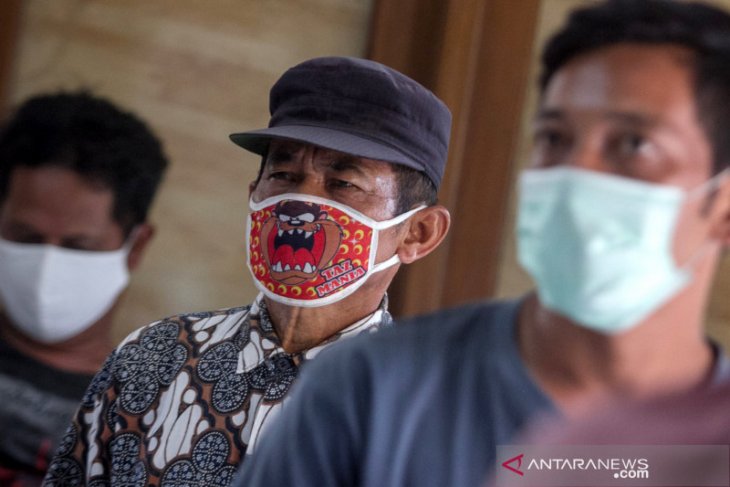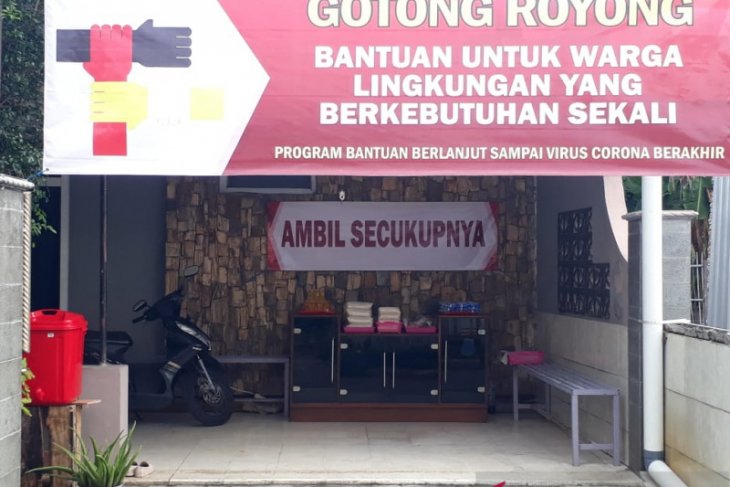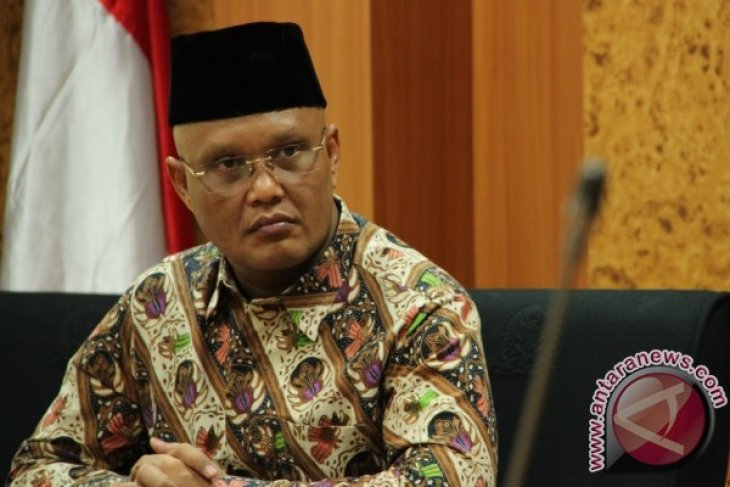Live Streaming
Program Highlight
Company Profile
May
Government to Disburse Social Aid to 8.3 Million Households
Written by Ani Hasanah
Residents of Banyuanyar neighborhood in Solo, Central Java, wait for cash transfers at the neighborhood authority's office on May 15, 2020. (ANTARA PHOTO)
The Indonesian Government has promised to distribute social aid funds to 8.3 million beneficiary households that have been severely affected by the impact of the coronavirus pandemic, ahead of Idul Fitri, due on May 24.
The disbursement of social aid funds to 8.3 million of 9 million beneficiary households would be completed within five days, prior to the Idul Fitri celebration, Coordinating Minister for Human Development and Culture, Muhadjir Effendy, said in Jakarta on Monday.
Around 700,000 other beneficiary households residing in remote areas of Indonesia would receive cash transfers after the Idul Fitri celebration, he told newsmen at a press conference.
The social aid funds would be delivered to eligible recipients through state-owned postal service firm PT Pos Indonesia, he said.
Related news: Jokowi urges ministries to expedite disbursement of social assistance
Related news: DKI Jakarta's social aid packages incorporate six essential items
President Joko Widodo has asked bureaucrats to expedite the disbursement of social aid packages to beneficiary households across the country.
The novel coronavirus disease, or COVID-19, which initially emerged in the Chinese city of Wuhan at the end of 2019, has since spread to at least 202 countries and territories, including Indonesia, with a massive increase in death toll.
The Indonesian Government officially announced the country's first confirmed cases on March 2 this year. The ongoing pandemic has weakened the purchasing power of scores of Indonesian families, particularly those who have lost their jobs.
In Bogor City, the administration has transferred cash, or "Bantuan Langsung Tunai" (BLT), to as many as 23,000 families that have been severely affected by the economic fallout of the coronavirus outbreak.
The cash transfers were distributed to the recipients' homes with the help of PT Pos Indonesia on April 28, 2020, Bogor Deputy Mayor Dedie A Rachim revealed recently.
To break the chain of COVID-19 transmission, large-scale social restrictions have been enforced in several cities, including Jakarta, Bogor, Depok, Tangerang, Bekasi, and Pekanbaru.
The central government has also banned homebound travel, locally known as “mudik”, during the fasting month of Ramadhan and the Idul Fitri holiday season. (ANTARA)
May
Public Participation Paramount in Government's Fight against COVID-19
Written by Ani Hasanah
A resident provided free basic necessities to neighbors to help reduce the economic burden due to the COVID-19 pandemic. (ANTARA)
Presidential Chief of Staff Moeldoko emphasized that the government would encounter difficulties in countering the COVID-19 pandemic in the absence of active participation of the public.
"Without public participation, the government will face difficulties in the fight against the pandemic," Moeldoko noted in a statement in Jakarta on Monday.
The presidential chief of staff commended the initiative to edify and encourage the people to become actively involved in the fight against COVID-19, including in the development of the 10 Safe Houses application in several regions.
"Alhamdulillah (Thank God), the 10 Safe Houses Program has been developed in some cities across the country. Each of them works in accordance with the respective capacity," he remarked.
The community-based 10 Safe Houses application was initiated by the Presidential Staff Office and developed in some regions.
The application contains information on COVID-19 and serves as a reference for the public to handle the outbreak, including the self-screening application, to monitor the potential of COVID-19 transmission in each region.
It also involves suppliers of basic necessities, including vegetables, to help farmers, as well as telemedicine consultation and open public donation through the Wahid Foundation. The suppliers comprise Sayur Box, Cakap, Kimia Farma, Mediv-Kimia Farma, Alfa Group, Alfamind, DAV, and Prima Freshmart.
In Madiun District of East Java, a resident of Taman Village, Tatok Raya, initiated the distribution of free essential goods to those reeling from the impact of the pandemic.
Raya has placed some stocks of rice, instant noodles, eggs, edible oil, and sugar in the veranda of his house for the neighborhood’s residents.
RMG Madiun, a restaurant in the district, distributes free meals to the poor to reduce the economic burden owing to the COVID-19 pandemic.
During the Ramadhan fasting month, the restaurant distributes 300-350 packs of meals on a daily basis. (ANTARA)
May
Indonesia's SOEs Ordered to Anticipate New Normal with COVID-19
Written by Ani Hasanah
State-Owned Enterprises Minister Erick Thohir has ordered all state-owned companies to set up their respective COVID-19 task forces and prepare guidelines for anticipating the implementation of new normal scenario within the companies.
The guidelines would contain a timeline for implementing the scenario of new normal with COVID-19, Erick Thohir revealed in the SOEs Minister's letter number S- 336 /MBU/05/2020 that ANTARA received in Jakarta on Sunday.
"All elements of the nation, including state-owned enterprises, must support the government's strategies in coping with the global pandemic of new coronavirus disease (COVID-19)," he revealed in the letter.
The SOEs' COVID-19 Task Forces prepare the timeline for implementing the new normal by referring to policies of the SOEs Ministry, National Disaster Mitigation Agency (BNPB), and Health Ministry, as well as the potency of respective clusters and regions.
The task forces are also required to draft the COVID-19 protocols containing necessary matters, including human capital and culture, process and technology, as well as business continuity, he said.
All SOEs are also demanded to campaign the spirit of optimism in facing the new normal with COVID-19 through the hashtag #CovidSafe BUMN on any relevant media platform.
President directors are responsible for monitoring and evaluating the implementation of the new normal scenario within their respective companies, and are required to report it to the SOEs deputy minister.
Indonesian President Joko Widodo has called on the people at large to remain productive and safe. At the same time, they are also required to coexist with COVID-19.
The president highlighted the World Health Organization's information saying that the coronavirus would not disappear through the transmission curve could have been flattened.
Coronavirus infections initially emerged in the Chinese city of Wuhan at the end of 2019.
Since then, COVID-19 has spread to at least 202 countries and territories, including Indonesia, with a massive spurt in the death toll.
The Indonesian Government officially confirmed the country's first cases on March 2 this year.
To contain the spread of the coronavirus disease, it has enforced large-scale social restrictions and distancing measures in many cities, including Jakarta, Bogor, Bekasi, Surabaya, and Makassar.(ANTARA)
May
Indonesian Government Urged to Assist Media Outlets amid COVID-19 Pandemic
Written by Ani HasanahSukamta, a legislator representing the Prosperous Justice Party (PKS) Faction at the House of Representatives (DPR) (Antara)
A legislator urged the Indonesian Government to assist the country's mainstream media to enable them to survive the impacts of COVID-19 pandemic owing to their important role in disseminating accurate and credible information on COVID-19 to community members.
"Media outlets play an important role in disseminating information, educating our people, and combating hoaxes on COVID-19," said Sukamta, a legislator representing the Prosperous Justice Party (PKS) Faction at the House of Representatives (DPR), in Jakarta, Sunday.
Without the active participation of Indonesia's credible media outlets, the government's information on its efforts to fight against new coronavirus disease would not easily reach the people, Sukamta said.
To this end, the government must assist print and electronic media as well as news service in the country because this ongoing global pandemic of coronavirus has hit them harder than before, he said.
Several media outlets in Indonesia have actually suffered hardship in their business partly due to the people's changing ways of consuming news.
"The assistance scheme that the government has provided for micro, small and medium-scaled enterprises and other business entities needs also be given to our media outlets," he said.
The government, for instance, could offer tax relaxation and cooperation in information dissemination on COVID-19-related issues, he said, adding that despite the cooperation, the media outlets must still maintain their role as watchdog of the government.
The coronavirus disease, which initially struck the Chinese city of Wuhan at the end of 2019, has since spread to at least 202 countries and territories, including Indonesia, with a massive increase in death toll.
The Indonesian government officially announced the country's first confirmed cases on March 2 this year. The ongoing pandemic has weakened the purchasing power of scores of Indonesian families, particularly those who have lost their jobs.
To break the chain of transmission, large-scale social restrictions have been applied in several cities, including Jakarta, Bogor, Depok, Tangerang, Bekasi, and Surabaya.
The central government has also banned homebound travel, locally known as "mudik", during the fasting month of Ramadhan and the Idul Fitri holiday season. (ANTARA)



